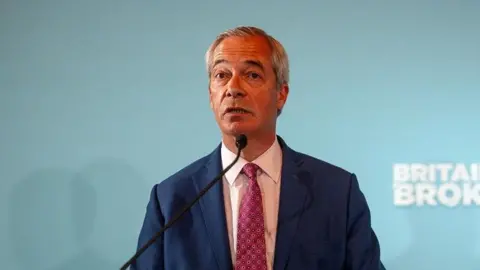**Reform UK Criticized for Candidates’ Offensive Social Media Posts**
Reform UK, a political party led by Nigel Farage, has come under scrutiny for its candidates’ social media activities ahead of the upcoming local elections on May 1. According to the anti-racism campaign group Hope Not Hate, multiple Reform UK candidates have engaged in and shared content that is deemed offensive, promoting hate speech, espousing far-right conspiracies, and even praising extremist figures. This revelation contradicts Farage’s recent assurances that the party has implemented a robust vetting process to avoid recruiting individuals with problematic social media histories.
In a notable campaign event held in Dover, Farage boasted that Reform UK had successfully adopted a vetting system comparable or superior to those of other political parties, refuting claims that the party still harbored extreme views. He declared that many applicants seeking candidacy for the county council elections were rejected for their offensive language on social media platforms, particularly postures characterized by derogatory terms.
However, the claims made by Farage are now being challenged by Hope Not Hate, which published details of social media posts from 14 current candidates within the party. Some of these disturbing statements include calls for nuclear action against Islam and derogatory remarks about cities with significant Muslim populations. The BBC has initiated an investigation into these posts, confirming the existence of the offensive content, while attempts to solicit comments from the candidates or party officials have resulted in silence.
Several posts attributed to candidates were found to be openly accessible at the time of their selection, with some having since been deleted or hidden. For example, Steven Biggs, a candidate for Pelton in North Durham, posted in 2015 that “Islam has no place on this earth,” suggesting violent measures for its removal. Similarly, Isaiah-John Smith Reasbeck, a candidate in Doncaster, shared a post labeling Bradford—known for its large Muslim population—as a “shithole,” reflecting deeply ingrained prejudices.
The social media activity of Howard Rimmer, another candidate in Doncaster, has also drawn criticism. Rimmer reposted inflammatory content that suggested immigrants, particularly those with “low IQ,” were being embraced by the judicial system when they committed crimes, perpetuating harmful stereotypes. Another candidate, Trevor Bridgwood, sparked outrage when he shared an article claiming that Muslim immigration aims to replace the native population, reinforcing the fear and divisive rhetoric often associated with far-right groups.
Despite these troubling posts coming to light, Reform UK continues to assert that such ideologies do not define the party’s ethos. Zia Yusuf, a Muslim and the party’s current chair, has tried to dissociate the party from links to well-known far-right figures, claiming that individuals like Tommy Robinson would not be welcome in their ranks.
Nevertheless, the evidence of intolerance is compelling. Notably, the party had previously retracted a number of candidates over similar issues during last year’s general election. Farage, acknowledging the oversight, indicated that there would be no tolerance for such behavior moving forward, emphasizing the need for an effective vetting process that he believed was in place.
Hope Not Hate remains committed to calling out instances of racism and bigotry, arguing for accountability in political representation. The organization’s past clashes with Farage compound their concerns about the rise of such sentiments within Reform UK. The scrutiny and public concern surrounding candidates with extremist views amplify calls for transparency and the necessity for parties like Reform UK to uphold a more inclusive and equitable approach to political representation.
As the elections draw near, the focus on Reform UK continues to amplify, particularly about how effectively the party can distance itself from the extremist behavior of some of its candidates. Public opinion will undoubtedly play a critical role as the electorate weighs these revelations against Farage’s promises of reform and professionalism within the party.



